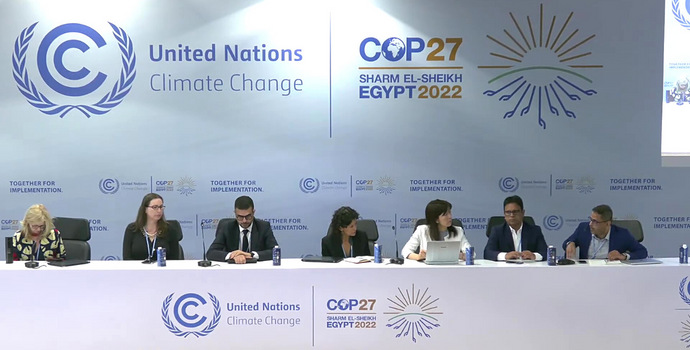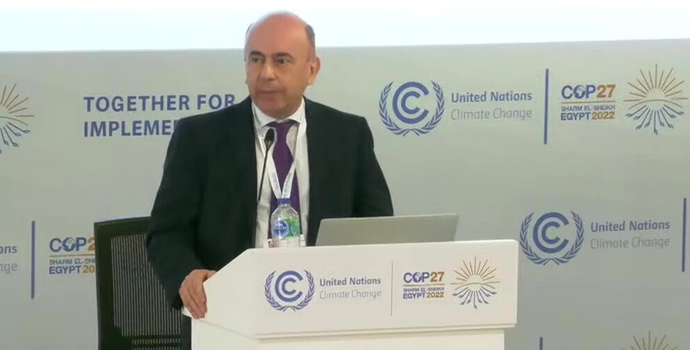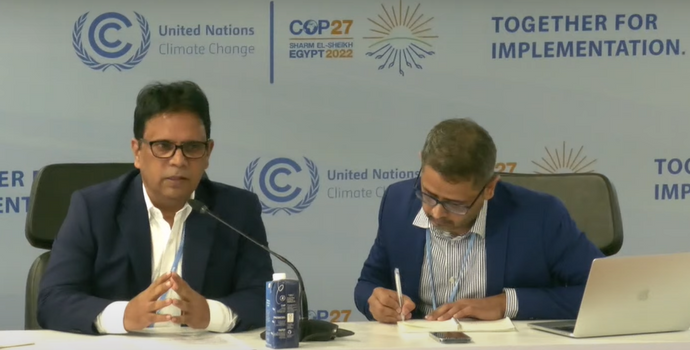- About Us
-
Who we are
-
- Publications
-
- ADPC Academy
-
MediaADPC'S NEWS
ADPC highlights the need to scale-up effective climate investments at COP27 ADPC highlights the need to scale-up effective climate investments at COP27
14 Nov 2022
Sharm El-Sheikh, Egypt

Panelists discussing the importance of scaling-up actions for effective climate investments at a panel discussion at COP27 in Sharm El Sheikh, Egypt
Financing is critical for scaling up the implementation of climate investments, and in the context of climate adaptation and resilience, it is equally important to ensure that such investments are effective.
Article 7.14 of the Paris Agreement explicitly outlines the need to recognize the adaptation efforts of developing country parties, enhance the implementation of adaptation action, and review the adequacy and effectiveness of adaptation efforts.
Asian Disaster Preparedness Center (ADPC), together with the Asian Development Bank (ADB) and the Japan Water Forum, organized a panel discussion on ‘Actions for Scaling-up Effective Investments in Climate Adaptation and Resilience’ at the 27th United Nations Conference of Parties (COP27) in Sharm El-Sheikh, Egypt on 14 November 2022.
The session explored the design and implementation of climate adaptation investments and what factors enable their long-term effectiveness. It also highlighted experiences and lessons learned from across the world on implementing different types of investment programs.

Mr. Bruno Carrasco, Director General and Chief Compliance Officer, Asian Development Bank (ADB), delivering his opening remarks.
Mr. Bruno Carrasco, Director General and Chief Compliance Officer of ADB, welcomed all participants in his opening remarks and explained how ADB is positioning itself as a climate bank for Asia and the Pacific region.
‘We have made a commitment to raise our level of ambition for climate financing to US $100 billion over the period 2019 through to 2030,’ he said, explaining that US $34 billion of that amount is targeting adaptation and US $10 billion is targeting water sector activities.
Mr. Carrasco also mentioned the effectiveness of adaptation investments depend on partners’ understanding of medium/long-term climate risks, addressing the root causes of vulnerability, supporting inclusive decision-making, assessing current financial systems and properly monitoring progress.

Mr. Aslam Perwaiz, Deputy Executive Director of ADPC, sharing project experiences and lessons learned in climate financing and investments.
Mr. Aslam Perwaiz, Deputy Executive Director of ADPC, highlighted the important roles that central finance agencies and sectoral Ministries play in making informed adaptation investments, citing experiences from a 5-year regional project on Climate Adaptation and Resilience (CARE) for South Asia.
Mr. Perwaiz explained that ADPC, through this project, has been supporting the national and sub-national Governments in the region in increasing the availability and utility of finance to implement planned adaptation actions.
‘In Bangladesh, Nepal and Pakistan, we are utilizing climate change financing frameworks to support mainstreaming of climate actions into public financing using climate budget codes and monitoring climate expenditures’, he said.
Mr. Perwaiz also spoke about how to incorporate social considerations into the process, citing lessons learned from the Building Resilience through Inclusive and climate-adaptive Disaster Risk Reduction in Asia-Pacific (BRDR) program.
‘There are a number of strategies and policies which talk about how to incorporate rights-based, inclusive and more gender-equal approaches, but they don’t provide much information on how much it will cost,’ he said, explaining that this creates difficulties for Ministries to allocate the needed resources.
‘We really need to look beyond end-point vulnerabilities if we are looking for equity considerations,’ Mr. Perwaiz added, suggesting that it is important to incorporate climate risk information into different budget phases.
Other panelists included Ms. Anne Hammil, International Institute for Sustainable Development (IISD), Ms. Louise Wilson, Foreign and Commonwealth Development Office (FCDO), UK, Ms. Noelle O’Brien, ADB, Mr. Walid Oueslati, Organisation for Economic Co-operation and Development (OECD) and Ms. Yumiko Asayama, Japan Water Forum.
Ms. Maria del Pilar Bueno, Senior Researcher at the National Council of Scientific and Technical Research (CONICET), Argentina, and UNFCCC Adaptation Committee Member, also provided context and background research.
Watch the full recording here.
Climate Adaptation and Resilience (CARE) for South Asia project is supported by the World Bank and contributes to an enabling environment for climate resilience policies and investments in select sectors and countries in the region.
Building Resilience through Inclusive and climate-adaptive Disaster Risk Reduction in Asia-Pacific (BRDR) program is supported by the Swedish International Development Cooperation Agency (Sida) and implemented jointly by ADPC, the Swedish Civil Contingencies Agency (MSB), the Stockholm Environment Institute (SEI), and the Raoul Wallenberg Institute (RWI).
Latest NewsRelated Trainings
-